November 13, 2020 | Nora Samaranayake
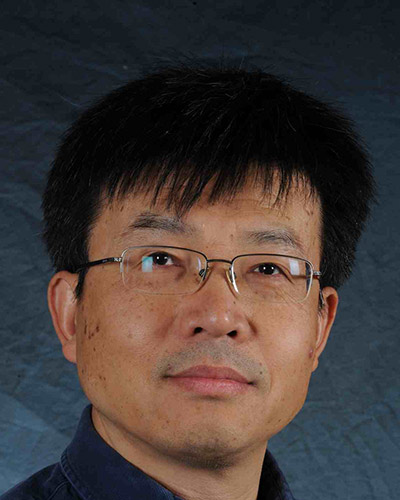
Dr. Lishan Su will head the Institute’s Division of Virology, Pathogenesis and Cancer, and will be receiving the Charles Gordon Smith Endowed Professorship for HIV Research
Robert C. Gallo, MD, the Homer & Martha Gudelsky Distinguished Professor in Medicine at the University of Maryland School of Medicine (UMSOM) and Co-Founder & Director of the UMSOM’s Institute of Human Virology (IHV), announced today that a team of leading scientists in human immunology, virology and stem cell biology, led by Lishan Su, PhD, joined the Institute of Human Virology on October 1 with academic appointments in the UMSOM Department of Pharmacology. As part of the Maryland E-Nnovation Initiative Fund (MEIF) to recruit top research faculty and a donation to the Institute of Human Virology from the Charles Gordon Estate, Dr. Su will be receiving the Charles Gordon Smith Endowed Professorship for HIV Research. Dr. Su will also head the Institute of Human Virology's Division of Virology, Pathogenesis and Cancer.
The team will include a 12-person Laboratory of Viral Pathogenesis and Immunotherapy with two faculty appointments as well as major public and private sector research funding.
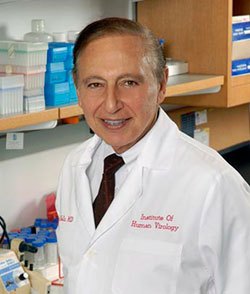 Dr. Gallo made the announcement in conjunction with University of Maryland School of Medicine Dean E. Albert Reece, MD, PhD, MBA and Margaret M. McCarthy PhD, the James & Carolyn Frenkil Dean’s Professor, Chair of the Department of Pharmacology.
Dr. Gallo made the announcement in conjunction with University of Maryland School of Medicine Dean E. Albert Reece, MD, PhD, MBA and Margaret M. McCarthy PhD, the James & Carolyn Frenkil Dean’s Professor, Chair of the Department of Pharmacology.
“Dr. Su is one of the most successful active basic researchers in America,” said Dr. Gallo, who is also Co-Founder and Chairman of the International Scientific Leadership Board of the Global Virus Network. “His research is groundbreaking, and we are so pleased to have him join the Institute of Human Virology and lead our Division of Infectious Agents and Cancer, which under his sound leadership, will flourish.”
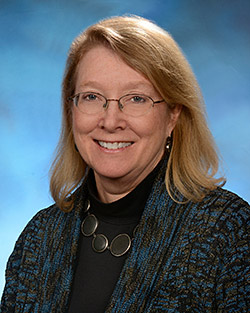 Dr. McCarthy added: “Dr. Su’s continuing ground-breaking work in HIV and Hepatitis B will be a huge asset to the Department of Pharmacology. I look forward to working with him on advances that could open the door to new therapeutics.”
Dr. McCarthy added: “Dr. Su’s continuing ground-breaking work in HIV and Hepatitis B will be a huge asset to the Department of Pharmacology. I look forward to working with him on advances that could open the door to new therapeutics.”
Dr. Su was a faculty member in the Lineberger Comprehensive Cancer Center and Professor in the Department of Microbiology & Immunology at University of North Carolina-Chapel Hill since 1996. He received his BS degree in Microbiology from Shandong University, his PhD degree in Virology from Harvard University, and did his post-doctoral training in Stem Cell Biology & Immunology at Stanford University. He worked as a senior research scientist at SyStemix/Sandoz (Novartis), focusing on HIV-1 pathogenesis and stem cell-based gene therapy in humanized mice and in patients.
“I am excited to continue to expand my research programs at the Institute of Human Virology,” said Dr. Su. “I have long been impressed by the Baltimore-DC area's research centers with great basic and clinical research programs. The Institute of Human Virology, co-founded and directed by Dr. Robert Gallo, is one of the first research institutes in the U.S. to integrate basic science, population studies and clinical trials to understand and treat human virus-induced diseases. The School of Medicine's Department of Pharmacology, headed by Dr. Margaret McCarthy, has been outstanding in developing novel therapeutics, including breast cancer drugs. I look forward to working with my new colleagues at the Institute of Human Virology and the Department of Pharmacology, and across the University of Maryland School of Medicine, to expand and translate my research programs to treating human inflammatory diseases, including virus infection and cancer.”
Dr. Su has extensive research experience in human immunology, virology and stem cell biology. Dr. Su made important contributions to several areas of human immunology and infectious diseases, particularly in studying human immuno-pathology of chronic virus infections. His lab at UNC-Chapel Hill published important findings in identifying novel virological and immunological mechanisms of HIV-1 pathogenesis. Furthermore, his lab established humanized mouse models with both human immune and human liver cells that support HCV or HBV infection, human immune responses, and human liver fibrosis. In recent years, Dr. Su’s group discovered, and focused on, the pDC-interferon axis in the immuno-pathogenesis and therapy of chronic HIV & HBV infections. The group also started investigation of the pDC-IFN axis in tumor microenvironments and in cancer immune therapy.
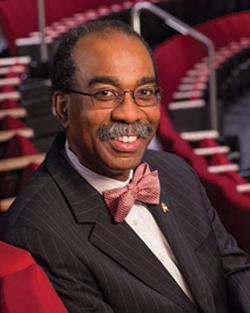 “I am so pleased to welcome Dr. Su to our faculty. His work advances the mission of the School of Medicine, which is to provide important new knowledge in the area of immunology and chronic disease to discover new approaches for treatments,” said Dean Reece, who is also University Executive Vice President for Medical Affairs and the John Z. and Akiko K. Bowers Distinguished Professor. “Dr. Su’s stellar research capabilities will provide vital opportunities for collaboration across our Institutes and Departments.”
“I am so pleased to welcome Dr. Su to our faculty. His work advances the mission of the School of Medicine, which is to provide important new knowledge in the area of immunology and chronic disease to discover new approaches for treatments,” said Dean Reece, who is also University Executive Vice President for Medical Affairs and the John Z. and Akiko K. Bowers Distinguished Professor. “Dr. Su’s stellar research capabilities will provide vital opportunities for collaboration across our Institutes and Departments.”
About the Institute of Human Virology
Formed in 1996 as a partnership between the State of Maryland, the City of Baltimore, the University System of Maryland and the University of Maryland Medical System, IHV is an institute of the University of Maryland School of Medicine and is home to some of the most globally-recognized and world-renowned experts in all of virology. The IHV combines the disciplines of basic research, epidemiology and clinical research in a concerted effort to speed the discovery of diagnostics and therapeutics for a wide variety of chronic and deadly viral and immune disorders - most notably, HIV the virus that causes AIDS. For more information, www.ihv.org and follow us on Twitter @IHVmaryland.
About the University of Maryland School of Medicine
Now in its third century, the University of Maryland School of Medicine was chartered in 1807 as the first public medical school in the United States. It continues today as one of the fastest growing, top-tier biomedical research enterprises in the world -- with 45 academic departments, centers, institutes, and programs; and a faculty of more than 3,000 physicians, scientists, and allied health professionals, including members of the National Academy of Medicine and the National Academy of Sciences, and a distinguished two-time winner of the Albert E. Lasker Award in Medical Research. With an operating budget of more than $1.2 billion, the School of Medicine works closely in partnership with the University of Maryland Medical Center and Medical System to provide research-intensive, academic and clinically based care for nearly 2 million patients each year. The School of Medicine has more than $563 million in extramural funding, with most of its academic departments highly ranked among all medical schools in the nation in research funding. As one of the seven professional schools that make up the University of Maryland, Baltimore campus, the School of Medicine has a total population of nearly 9,000 faculty and staff, including 2,500 student trainees, residents, and fellows. The combined School of Medicine and Medical System (“University of Maryland Medicine”) has an annual budget of nearly $6 billion and an economic impact more than $15 billion on the state and local community. The School of Medicine faculty, which ranks as the 8th highest among public medical schools in research productivity, is an innovator in translational medicine, with 600 active patents and 24 start-up companies. The School of Medicine works locally, nationally, and globally, with research and treatment facilities in 36 countries around the world. Visit medschool.umaryland.edu
Contact
Institute of Human Virology
Nora Samaranayake
Director of Marketing and Public Relations
(410) 706-8614 (phone)
(410) 706-1952 (fax)
nsamaranayake@ihv.umaryland.edu
Related stories
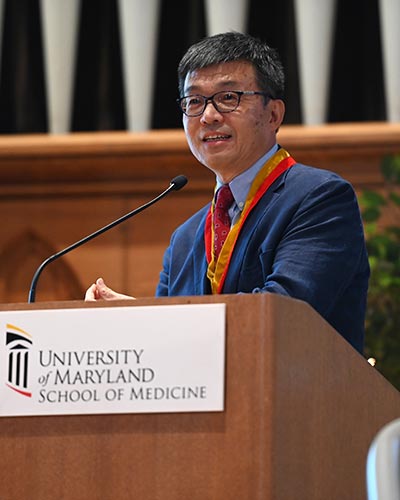
Wednesday, November 09, 2022
Lishan Su, PhD, Invested as the UMSOM Charles Gordon Smith Endowed Professor for HIV Research
With his 92-year-old mother watching via live stream from the city of Qingdao, China, and an in-person audience of friends and colleagues gathered in Westminster Hall, Lishan Su, PhD, an internationally prominent virologist and immunologist at the University of Maryland School of Medicine’s (UMSOM) Institute of Human Virology (IHV), was invested as the Charles Gordon Smith Endowed Professor for HIV Research. Dr. Su is a Professor in the Departments of Pharmacology and Microbiology & Immunology at UMSOM’s IHV, who also serves as the Director of the Division of Virology, Pathogenesis, and Cancer at the Institute.
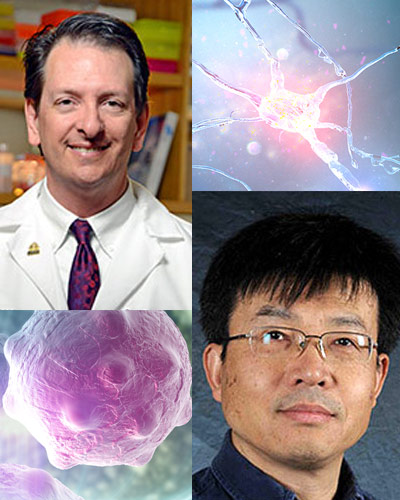
Monday, November 16, 2020
University of Maryland School of Medicine Establishes Two New Endowed Professorships Through Private Gifts and Matching State Funds
– University of Maryland School of Medicine (UMSOM) Dean E. Albert Reece, MD, PhD, MBA, announced today that the school has been awarded $1.5 million in matching funds from the Maryland E-Nnovation Initiative Fund (MEIF), administered by the Maryland Department of Commerce. The funds, when combined with private philanthropy, has allowed the creation of two new endowed professorships – one in the Department of Neurology and one in at the Institute of Human Virology (IHV). As part of its goal to attract and retain top faculty and foster the development of new technologies and therapies, the School of Medicine had requested that the funds be used to establish these two new endowed professorships.
